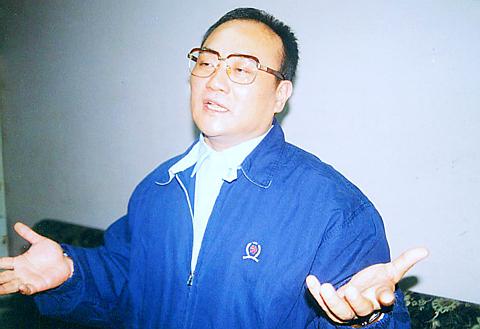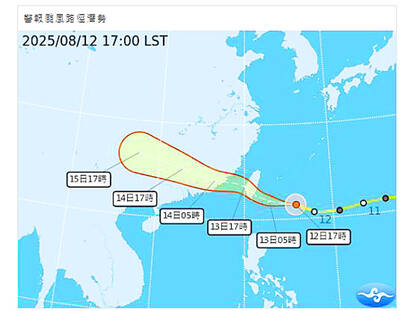After more than two years on the run from police, former Chiayi County council speaker Hsiao Teng-piao (
But if anyone was expecting a tearful expression of remorse, they were to be disappointed, as Hsiao declared defiantly that he had not surrendered himself to confess, but rather to expose loop-holes in the government's crusade against organized crime, which had made him a target.
Hsiao, who was sought for arrest in the large-scale Chihpin (

PHOTO: TSAI MIN-HSI, LIBERTY TIMES
Many of these appearances were due to his position as an elected councilor, as he had enjoyed immunity from prosecution when the council was in session. Indeed, on several occasions since 1996, Hsiao humiliated law enforcement authorities by disappearing as soon as his immunity lapsed with the adjournment of the council.
Earlier this month, Hsiao reportedly sent a message to authorities through his niece, legislator Hsiao Yuan-yu (蕭苑瑜), that he wanted to turned himself in and have his name cleared through legal channels. However, with a unit of heavily armed police awaiting his arrival, Hsiao did not show up as he had promised, instead issuing a statement alleging he was victim of a miscarriage of justice.
While law enforcement agencies took a whipping from the public for their failure to catch Hsiao, the fugitive managed to conduct several TV interviews in which he gave "his side of the story." These were broadcast throughout the island on Monday.
Yesterday, he finally gave himself in by turning up at the Chiayi Prosecutor's Office, where he was greeted by a crowd of television crews and reporters.
On his way into the office, Hsiao gave his reason for finally surrendering, which was that he expects his case will now more likely be subject to due process, unlike two years ago, when his "political enemy" Liao Cheng-hao (廖正豪) served as Minister of Justice.
Hsiao accused the former justice minister of using the anti-gangster crusade for political purposes against him Chiayi County, where he said Liao has close connections with his political rivals. Liao also grew up in the county.
"There were a bunch of legal loopholes in the crackdown, which was initiated by Liao. Some people were arrested without proof of their crimes being furnished, and some were convicted without a fair trial. Is this the kind of thing that takes place in a country governed by the rule of law?" Hsiao asked.
"Liao and my other enemies have exhausted every means to get me out of the political arena. When he (Liao) served as justice minister, a rather powerful position, I couldn't speak freely about these matters," Hsiao said. "So I have been waiting, waiting for the day when justice would finally be served."
The so-called Chihpin program was launched by Liao as a broad sweep against anyone with sus-pected links to organized crime. It has been pursued under the Anti-Hooligan Law, a controversial piece of legislation which allows for the circumvention of proper legal procedure. Most people charged under the program have been flown directly to the maximum security prison on Green Island after being summarily tried in a special security court. Probably the most controversial aspect of the law, however, is that people can be convicted based on the testimony of anony-mous witnesses.
Hsiao called on the Ministry of Justice to reassess the program and make changes so that it becomes compliant with the intent of Taiwan's law.
The ministry, however, stood firm yesterday on continuing its anti-gangster program, saying it had produced clear results.
"Since the program was launched, there has been a noticeable improvement in social order," said Deputy Justice Minister Tseng Yung-fu (曾勇夫). "A number of gang leaders have fled overseas to escape the crackdown. Whatever Hsiao might say about it, the ministry will definitely continue the program in the public interest."
Following his surrender yesterday, Hsiao is to face six charges, including intimidation, gaming, violation of trust, breach of electoral law, violation of liberty and illegal possession of someone else's property.

DEFENSE: The first set of three NASAMS that were previously purchased is expected to be delivered by the end of this year and deployed near the capital, sources said Taiwan plans to procure 28 more sets of M-142 High Mobility Artillery Rocket Systems (HIMARS), as well as nine additional sets of National Advanced Surface-to-Air Missile Systems (NASAMS), military sources said yesterday. Taiwan had previously purchased 29 HIMARS launchers from the US and received the first 11 last year. Once the planned purchases are completed and delivered, Taiwan would have 57 sets of HIMARS. The army has also increased the number of MGM-140 Army Tactical Missile Systems (ATACMS) purchased from 64 to 84, the sources added. Each HIMARS launch pod can carry six Guided Multiple Launch Rocket Systems, capable of

GET TO SAFETY: Authorities were scrambling to evacuate nearly 700 people in Hualien County to prepare for overflow from a natural dam formed by a previous typhoon Typhoon Podul yesterday intensified and accelerated as it neared Taiwan, with the impact expected to be felt overnight, the Central Weather Administration (CWA) said, while the Directorate-General of Personnel Administration announced that schools and government offices in most areas of southern and eastern Taiwan would be closed today. The affected regions are Tainan, Kaohsiung and Chiayi City, and Yunlin, Chiayi, Pingtung, Hualien and Taitung counties, as well as the outlying Penghu County. As of 10pm last night, the storm was about 370km east-southeast of Taitung County, moving west-northwest at 27kph, CWA data showed. With a radius of 120km, Podul is carrying maximum sustained

Tropical Storm Podul strengthened into a typhoon at 8pm yesterday, the Central Weather Administration (CWA) said, with a sea warning to be issued late last night or early this morning. As of 8pm, the typhoon was 1,020km east of Oluanpi (鵝鑾鼻), Taiwan’s southernmost tip, moving west at 23kph. The storm carried maximum sustained winds of 119kph and gusts reaching 155kph, the CWA said. Based on the tropical storm’s trajectory, a land warning could be issued any time from midday today, it added. CWA forecaster Chang Chun-yao (張竣堯) said Podul is a fast-moving storm that is forecast to bring its heaviest rainfall and strongest

TRAJECTORY: The severe tropical storm is predicted to be closest to Taiwan on Wednesday and Thursday, and would influence the nation to varying degrees, a forecaster said The Central Weather Administration (CWA) yesterday said it would likely issue a sea warning for Tropical Storm Podul tomorrow morning and a land warning that evening at the earliest. CWA forecaster Lin Ting-yi (林定宜) said the severe tropical storm is predicted to be closest to Taiwan on Wednesday and Thursday. As of 2pm yesterday, the storm was moving west at 21kph and packing sustained winds of 108kph and gusts of up to 136.8kph, the CWA said. Lin said that the tropical storm was about 1,710km east of Oluanpi (鵝鑾鼻), Taiwan’s southernmost tip, with two possible trajectories over the next one